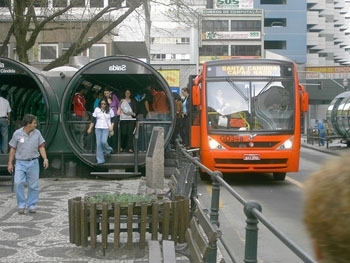A consortium including MIT-Portugal Program Transportation Systems collaborators at MIT and IST-Lisbon has been awarded a $3.5 million, five-year grant from the Volvo Research and Education Foundation (VREF) for a Center of Excellence on Bus Rapid Transit.
The consortium is headed by Juan Carlos Muñoz of the Pontificia Universidad Católica de Chile (PUC), who will spend his sabbatical at MIT next year, hosted by the Department of Civil and Environmental Engineering (CEE). MIT collaborators will be CEE's Nigel Wilson; Chris Zegras, assistant professor in the Department of Urban Studies and Planning; and Fred Salvucci, senior lecturer in CEE. Another member of the new consortium is the Instituto Superior Técnico of the Technical University of Lisbon, a main partner in Transportation Systems of the MIT-Portugal Program. The IST team is led by professors José Viegas and Rosário Macário.
This is the eighth such center funded by VREF. The impetus for their efforts is the promise of public transport investment as a springboard for a sustainable future, especially in large metropolitan areas with growing populations. While rail systems loom large in many strategic statements on urban reform, bus rapid transit has attracted increasing attention in the past several years because of dramatic improvements achieved in a growing number of cities around the world, including several in Latin America — in particular Curitiba, Bogotá, Quito, Mexico City and (although still controversial) Santiago de Chile.
The primary goal of this Center of Excellence will be to develop a new framework for the planning, design, financing, implementation and operation of bus rapid transit in different urban areas, offering clear guidelines to decision makers on when and how such projects can enhance mobility and meet accessibility needs. An essential goal is to make the knowledge developed through the Center widely available to support more successful bus rapid transit deployment, and in particular to identify elements which are transferable between existing and prospective systems. The focus will be not only at the project level, but also on how such projects interact with other elements of the urban system so that the total urban mobility system is transformed.
The center will develop an observatory to gather, interpret and present case studies; a laboratory to develop in-depth understanding of the factors underlying system performance; an educational program to deploy the knowledge gained from the observatory and laboratory; and support for implementation and dissemination through the worldwide work of the center’s partners and associated institutional networks.
MIT’s participation in the center draws on the new Transportation@MIT initiative, a collaboration between the School of Engineering, the School of Architecture + Planning and the MIT Sloan School of Management, led by Cynthia Barnhart, associate dean of engineering for academic affairs. Currently a two-year pilot program, the initiative plans to develop two labs, one in Cambridge and one outside the United States, where researchers can apply and test new processes, technologies and policies.
In addition to PUC, MIT, and IST-Lisbon, the consortium partners include the Institute of Transport and Logistics Studies of the University of Sydney, and EMBARQ (The World Resources Institute Centre for Sustainable Transport) Network.
The consortium is headed by Juan Carlos Muñoz of the Pontificia Universidad Católica de Chile (PUC), who will spend his sabbatical at MIT next year, hosted by the Department of Civil and Environmental Engineering (CEE). MIT collaborators will be CEE's Nigel Wilson; Chris Zegras, assistant professor in the Department of Urban Studies and Planning; and Fred Salvucci, senior lecturer in CEE. Another member of the new consortium is the Instituto Superior Técnico of the Technical University of Lisbon, a main partner in Transportation Systems of the MIT-Portugal Program. The IST team is led by professors José Viegas and Rosário Macário.
This is the eighth such center funded by VREF. The impetus for their efforts is the promise of public transport investment as a springboard for a sustainable future, especially in large metropolitan areas with growing populations. While rail systems loom large in many strategic statements on urban reform, bus rapid transit has attracted increasing attention in the past several years because of dramatic improvements achieved in a growing number of cities around the world, including several in Latin America — in particular Curitiba, Bogotá, Quito, Mexico City and (although still controversial) Santiago de Chile.
The primary goal of this Center of Excellence will be to develop a new framework for the planning, design, financing, implementation and operation of bus rapid transit in different urban areas, offering clear guidelines to decision makers on when and how such projects can enhance mobility and meet accessibility needs. An essential goal is to make the knowledge developed through the Center widely available to support more successful bus rapid transit deployment, and in particular to identify elements which are transferable between existing and prospective systems. The focus will be not only at the project level, but also on how such projects interact with other elements of the urban system so that the total urban mobility system is transformed.
The center will develop an observatory to gather, interpret and present case studies; a laboratory to develop in-depth understanding of the factors underlying system performance; an educational program to deploy the knowledge gained from the observatory and laboratory; and support for implementation and dissemination through the worldwide work of the center’s partners and associated institutional networks.
MIT’s participation in the center draws on the new Transportation@MIT initiative, a collaboration between the School of Engineering, the School of Architecture + Planning and the MIT Sloan School of Management, led by Cynthia Barnhart, associate dean of engineering for academic affairs. Currently a two-year pilot program, the initiative plans to develop two labs, one in Cambridge and one outside the United States, where researchers can apply and test new processes, technologies and policies.
In addition to PUC, MIT, and IST-Lisbon, the consortium partners include the Institute of Transport and Logistics Studies of the University of Sydney, and EMBARQ (The World Resources Institute Centre for Sustainable Transport) Network.






